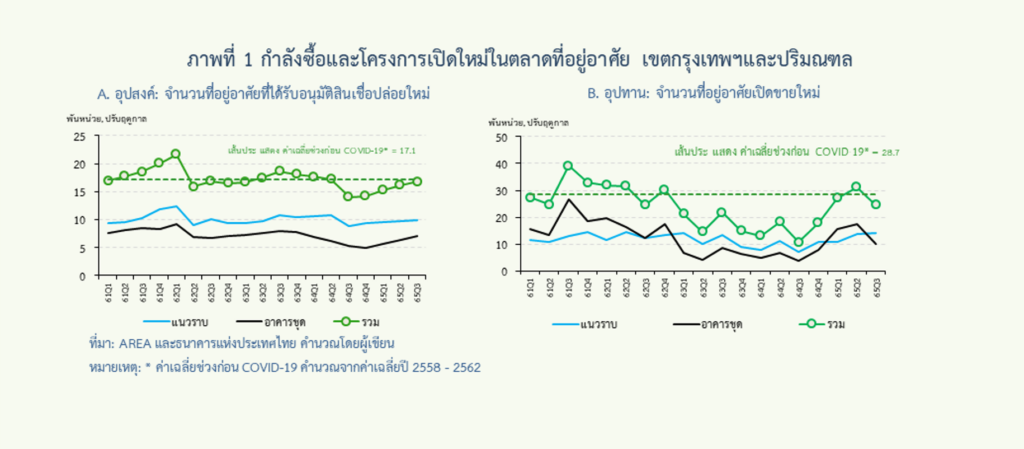The COVID-19 pandemic has had a huge impact on the real estate sector. especially the housing market from restricting economic activities that directly affect income and employment Therefore, the BOT has implemented policies to mitigate the impact and stimulate economic activities. together with the implementation of accommodative monetary policy Increasing liquidity for the business sector Installment of financial institution criteria to help debtors while the government has issued measures for general assistance (Broad-based) and targeted assistance. However, the current overall economy, income, employment and housing market have continued to recover. The implementation of accommodative policies, such as low interest rates, has become less necessary. Therefore, the Monetary Policy Committee (MPC) has continuously announced policy normalization in all 3 meetings. past This article will discuss the importance of the housing market to the Thai economy. Conditions of the housing market and related policies during the past COVID-19
One of the reasons why the housing market plays such an important role in the economy is its direct relevance to economic activity and its connection to other business sectors.
If considering the direct relationship of the housing market to the economy through GDP figures, it was found that over the past 5 years, the housing market has been able to create a real value of about 1 in 10 of GDP, or equivalent to a market value of about 1.3 trillion baht. through 2 main channels, namely (1) private investment from the housing construction sector, which accounts for about 8% of total investment, and (2) private consumption from directly related to housing products such as furniture, which accounted for more than 16% of total consumption. In addition, the housing market also indirectly affects the economy, including The development of new projects stimulates production in other businesses such as construction materials, etc., as well as the expansion of the housing market, often resulting in economic activities such as investment in trade and services in the vicinity (2) on the buyer side. If housing prices rise Owners tend to consume other goods. increases in line with the wealth effect, which boosts the overall economy
The spread of COVID-19 in Thailand since the beginning of 2020 has inevitably affected the activities in the housing market both in terms of demand and supply.
The protracted COVID-19 pandemic has resulted in a drop in income and buyer confidence. As a result, purchasing power and demand tend to weaken, especially for condominiums. This is reflected in the number of new residences (condominiums) approved for new loans in Bangkok and its vicinity in 2021, shrinking by 23% from the previous year (Figure 1A).

Weak purchasing power affects entrepreneurs’ confidence. Causing to postpone and cancel the opening of new projects. reflected in the quarterly number of new housing units launched in Bangkok and the perimeter, on average, from 2020 to 2021, at 16.6 thousand units, shrinking by more than 42% compared to the average before COVID-19 (Figure 1B).
However, the aforementioned impacts from COVID-19 have been partially mitigated by adjustments in both buyers who prefer low-rises and the remaining purchasing power of high-income groups. Entrepreneurs are also more flexible in reducing prices and launching new projects. Buyers demand more space and prefer low-rise buildings due to the work-from-home policy, along with high-priced housing. get attention Because the group of high-income buyers are not affected much. Entrepreneurs adjust themselves by organizing promotional activities and discount promotions to accelerate the release of inventories and maintain liquidity.
At the end of 2021, the easing of the COVID-19 situation and the relaxation of epidemic control measures resulted in a gradual recovery of economic activities and the housing market.
in the type of housing Low-rise housing is among the first to recover. partly as a result of the policy to support the purchasing power of the government For example, the relaxation of the LTV measure by allowing borrowers to buy 2nd-3rd homes can apply for a loan equal to the housing price. Since mid-2022, the recovery of the housing market has become more thorough, both horizontal and condominium. Reflected by the overall number of approved housing units, new loans (demand) and new housing units for sale (supply) in Bangkok and its vicinity, on average during the 2nd-3rd quarter of 2022, it was 16.4 thousand units and 27.8 thousand. units, respectively, which is the level that returned to the pre-COVID-19 average (Figure 1A and 1B). However, in the price level dimension, Demand for low-cost housing continued to recover more slowly than high-priced housing (Chart 2), reflecting the purchasing power of low-income buyers who remained fragile.
The economic recovery tends to continue and more comprehensively, reducing the need for accommodative policies.
but still need targeted assistance policies
Due to current economic developments and high inflationary pressures, the MPC announced a gradual increase in the policy rate. Meanwhile, the housing market recovered in line with the economy. Therefore, the relaxation of the LTV measure is less necessary. However, targeted housing policies are still necessary to take care of those affected by incomes that have not fully recovered, such as low-income buyers. Therefore, measures to help such groups are still seen, such as the Million House Project with a loan amount of no more than 1.5 million baht, etc. Looking forward. Although the economy is recovering more clearly, the development of the housing market still needs to be monitored. especially as a result of rising interest rates so that policy implementation is appropriate, on point and timely in line with the changing economic context This will help the economy grow sustainably.
Nattawadee Thanyakornkul
Monetary Policy Department


